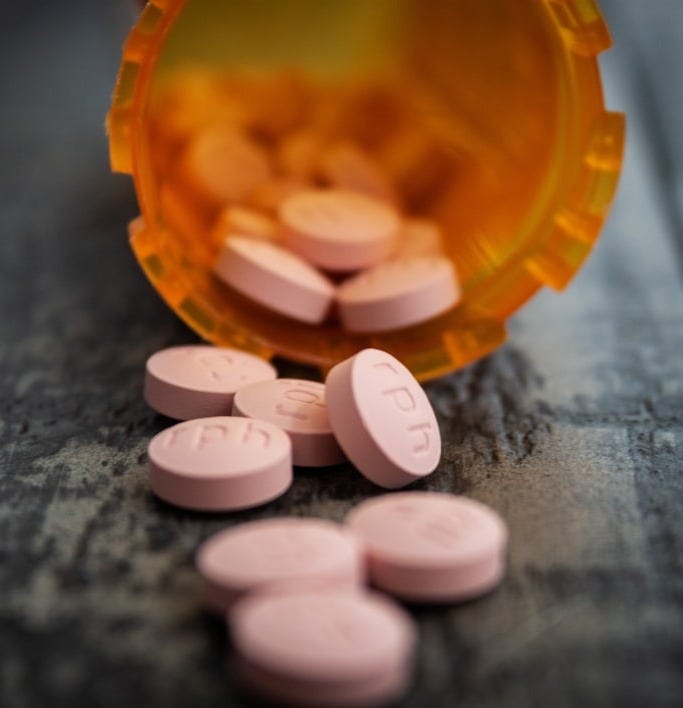Using Medications Wisely
My Conscious Approach to Better Health

When I broke my wrist, many years ago, the doctor prescribed a painkiller. It eased the pain, but afterward, I was achy and didn’t feel ‘right’ for days.
I gave myself prescribed shots for migraine headaches, which lessened them miraculously the first few times, but then I needed stronger doses to get the same relief.
When I had cataract surgery a few years ago, I was scheduled to have an anesthetic. When I asked if it was required, the anesthetist said, “Not really, it’s just to calm your nerves.” He offered to watch my blood pressure and use it only if necessary. It wasn’t!
So, I’ve used prescription drugs for years and been grateful for the relief they provided. At the same time, I’m leery of them - the side effects, the unexpected consequences, and their overuse.
My concern probably began when I worked for a police department.
I watched people destroy their lives and families because of drug use and counseled others in recovery as they tried to break addictions to crack and black tar heroin, often losing the battle. I understood their motivations and struggles despite disagreeing with their choices. That was a long time ago, but the memories remain.
The child who sent me a note that said, “My Mom is on the pipe (smoked cocaine); what should I do?”
Tired, worn-out grandparents who were raising grandchildren because drug-using or selling parents were dead or in prison.
The 10-year-old boy who found his mother dead in the bathtub from a drug overdose.
Those experiences set the stage for my concerns about medication, even though I use them. So did my husband’s experience. He was having memory issues before a nine-day hospital stay for emergency surgery, which I’m still not sure he needed. His body recovered quickly; his memory never did.
I’ve recently come across information that contributes to my worries.
According to experts, about 90% of older adults regularly take at least one prescription drug, nearly 80% regularly take at least two, and 36% take at least five different ones. Older adults who are frail, hospitalized, or in a nursing home take the most.
They also say the roots of the opioid epidemic can be traced to the late 1990s when prescription opioids became widely available. Overprescribing, coupled with the growth of illegal opioids like heroin and synthetic opioids such as fentanyl, has fueled the crisis.
The Lown Institute describes a culture of prescribing.
Advertisements linking prescription medications to happiness and health, the increased medicalization of normal human aging, the hurried pace of medical care, and the desire of both healthcare professionals and patients to “do something” have fostered a shared expectation that there is a “pill for every ill.”
Earlier this week, the DOJ announced that one of two doctors charged in connection with the death of actor Matthew Perry, who is best known for his role in the TV series Friends, agreed to plead guilty to distributing ketamine, a drug used medically for anesthesia, depression, and pain management. He is expected to plead guilty to four counts of distribution in the coming weeks. The charge carries a statutory maximum sentence of 40 years in federal prison.
Without a doubt, there are valid reasons for taking prescription drugs - they can and do provide relief and save lives.
I remember hearing Dr. Jen Ashton when she was a regular on Good Morning America, frequently reminding listeners that drugs are often necessary, and there are side effects, so people must always weigh the risks and benefits. That seemed like sound advice.
Today, I take only over-the-counter (OTC) medications and supplements. However, my apprehension is stronger than ever: prescriptions seem to be the treatment of choice, can be overly prescribed, and easily obtained.
If I need to take prescription medications, I would. Beforehand, though, I’ll ensure that they are really necessary, I’ll understand the side effects, make a conscious, informed decision about taking them, and obtain them from a trusted source. The consequences of not taking these precautions can interfere with aging well and lead to death.
I’d love it if you could share the Aging Well newsletter with others. I want to share the lessons I’ve learned throughout my life and caregiving years with as many people as possible. Above all, I want to continue expanding our community of readers.
So, please forward this email to a friend and invite them to join us. They can subscribe here:
Thank you for being part of the Aging Well community.
If you would like to support my work, consider donating to the Alzheimer's Association. This link takes you to their website. The choice is yours.
Janice Walton is a psychologist, a widow, a mother, a grandmother, a great-grandmother, and a writer. Her book Aging Well: 30 Lessons for Making the Most of Your Later Years is available on Amazon, and she has written articles for Substack for four years.


I’ve used prescription drugs for years and been grateful for the relief they provided. At the same time, I’m leery of them - the side effects, the unexpected consequences, and their overuse.
I'm with you on that issue.